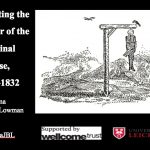
Summertime, and the Gibbeting ain’t Easy… By Emma Battell Lowman
Today is officially the first day of summer, and I welcome the season this year particularly grateful for something that this time last year hadn’t even crossed my mind. Thank goodness Britain no longer practices gibbeting! Between the bouts of monsoon-style rain, the sun is bursting through here in Leicester making for uneven […]

Turned off at Execution Dock: Thames Scenery in the City of the Gallows. By Richard Ward
Eighteenth-century London has, with good reason, been called “the city of the gallows”. Gibbets lined the approach to London in every direction, not least of which at various points along the Thames, where offenders sentenced to death by the High Court of Admiralty for crimes committed on the seas were hung in chains after […]

#SocialHistoryAssociationAnnualConference2016. By Emma Battell Lowman
In late March 2016, the Social History Association (SHA) met for its annual conference. In beautiful Lancaster, at the University of Lancaster, a large group of energetic scholars met to share new research, connect with colleagues, and celebrate four decades of successful operation. This was my first engagement with the Association. I have hesitated […]

A chance to talk about gibbeting and hanging in France? Yes, please! By Emma Battell Lowman
One of the joys of academic work is participating in study days or workshops that bring together a diverse group of scholars to approach a theme or issue from multiple vantage. It is easy to fall into working within the same networks and groups – whether textually in the form of the bodies of […]

Effigies, Real Bodies and Iconoclasm. By Sarah Tarlow
Last week I was in Chester to examine a PhD thesis there (congratulations to Dr Ruth Nugent – the third person to complete a PhD in the young and dynamic archaeology department there, under the guidance of Howard Williams). As a side note, Howard’s terrific blog, Archaeodeath, is always full of interesting reflections on […]

Post-Mortem Punishment: A Fate Worse than Death? By Rachel Bennett
A key question I have repeatedly asked myself in the researching and writing up of my PhD thesis, and one that permeates the Criminal Corpse project, asks why punish the dead? The 1752 Murder Act placed the post-mortem punishment of the corpse at the centre of the criminal justice system in Britain as it stipulated […]

Recent Comments